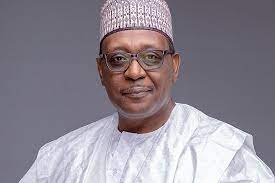The Coordinating Minister of Health and Social Welfare, Professor Muhammad Ali Pate, has commended Caroline Medical Centre, Abuja, for its new state-of-the-art facilities dedicated to revolutionising kidney care in Nigeria.
Pate made the commendation Wednesday while commissioning dialysis machines at the hospital’s new branch.
Represented by Professor Muhammad Raji Mahmud, the Chief Medical Director (CMD) of the National Hospital, Abuja, Pate said the facilities were a shining light in the fight against the burden of medical tourism and the high mortality rate associated with kidney disease in the country.
He said, “We stand here filled with immense pride and a deep sense of responsibility. This facility stands as a testament to the renewed focus on healthcare by this administration led by His Excellency, President Asiwaju Bola Ahmed Tinubu, who has pledged to bring renewed hope to Nigerians from all walks of life regardless of their social class or background. An essential part of the president’s agenda is to invest in infrastructure, equipment, human resources and clinical governance systems, thereby elevating the quality of healthcare available to all Nigerians.”
- Cocoa now gold in Taraba as buyers overwhelm farmers
- 7 passengers injured as bus crashes on Abuja-Lokoja road
He noted that Caroline Medical Centre was a symbol of hope for Nigerians and promised to provide world-class treatment “right here at home”, reducing the need for Nigerians to go abroad for medical care. The CMD of the hospital, Dr Elijah Miner, noted that the cost of medical tourism on kidney issues was over $1bn, saying, “So, it is a lot of money, and the only way we can deal with it is by having centres like this and trying to reverse the trend; and it can happen.”
He said over 1,000 people had undergone dialysis in the hospital’s facility, with about 1,000 transplants carried out in the last four and half years. He called on the government to help in supporting dialysis patients and producing consumables locally.
Itoro Out, a patient on dialysis, said he was diagnosed with Chronic Kidney Disease in 2022 and had been on dialysis since then. While describing the treatment as expensive, he urged the government to subsidise dialysis and transplant the way it subsidised HIV/AIDS drugs and treatment.
The Chairman of the occasion, Senator Ned Nwoko, said it was important to equip hospitals in the country and also pay health workers better remuneration to address the “japa” syndrome.

 Join Daily Trust WhatsApp Community For Quick Access To News and Happenings Around You.
Join Daily Trust WhatsApp Community For Quick Access To News and Happenings Around You.


